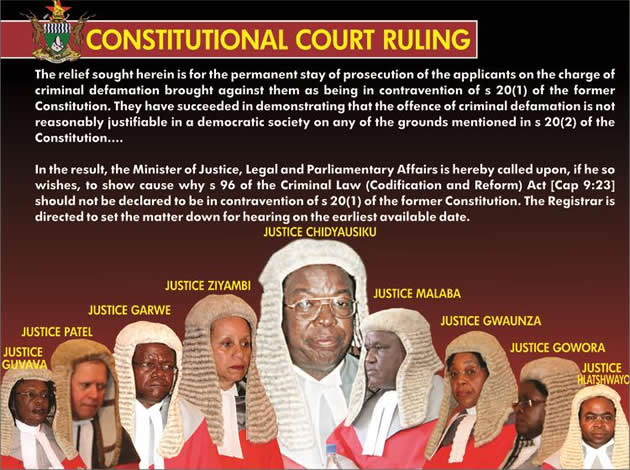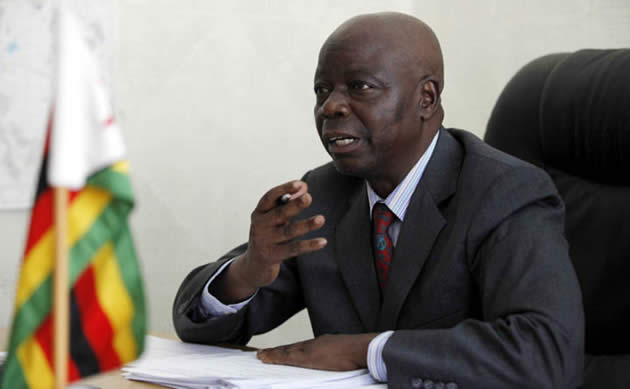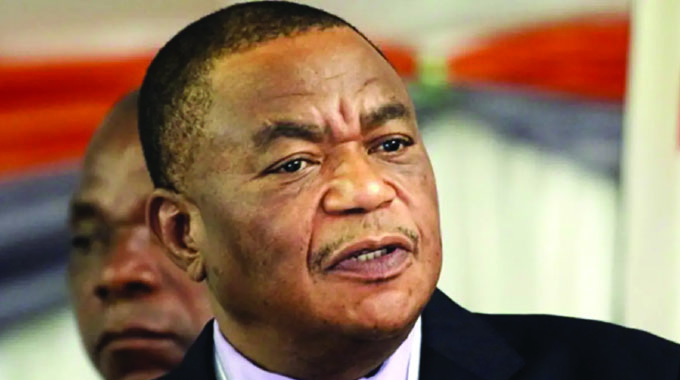Concourt rips criminal libel

 Daniel Nemukuyu Senior Court Reporter
Daniel Nemukuyu Senior Court Reporter
The Constitutional Court unanimously ruled yesterday that criminal defamation must be struck off the statutes because it is not a justifiable law in a democratic society like Zimbabwe’s.
The court invited Justice, Legal and Parliamentary Affairs Minister Emmerson Mnangagwa to defend the law if he so wished, before a final declaration is passed.
The Constitutional Court ruled against the law in a case brought by former Standard newspaper editor Nevanji Madanhire and reporter Nqaba Matshazi, who were being charged with criminally defaming Green Card chairperson Dr Munyaradzi Kereke.
In a unanimous ruling by the nine judges, the court presided over by Chief Justice Godfrey Chidyausiku ruled in a judgement written by Justice Barat Patel that criminalising defamation violated people’s freedom of expression and muzzled the media. The court found that the right of bringing a civil suit for damages adequately protected defamed people.
The journalists, charged with breaching Section 96 of the Criminal Law (Codification and Reform) Act, were seeking permanent stay of prosecution and repealing of the section from the statutes saying it was unconstitutional.
Madanhire and Matshazi were arrested after Dr Kereke reported to the police that they criminally defamed him in an article published in the Standard of November 6, 2011.
The article said Green Card was on the brink of collapse and failing to pay members, staff and creditors.
A Harare magistrate referred the case to the Constitutional Court after a successful application for such by the journalists.
“In short, it is not necessary to criminalise defamation statements,” Chief Justice Chidyausiku said yesterday.
“Consequently, I am satisfied that the offence is not reasonably justifiable in a democratic society within the contemplation of Section 20(2) of the former Constitution.
Accordingly, it is inconsistent with the freedom of expression guaranteed by Section 20(1) of that Constitution.”
Chief Justice Chidyausiku held that the journalists successfully proved their case.
“They have succeeded in demonstrating that the offence of criminal defamation is not reasonably justifiable in a democratic society on any of the grounds mentioned in Section 20(2) of the Constitution,” he said.
“In the result, the Minister of Justice, Legal and Parliamentary Affairs is hereby called upon, if he so wishes, to show cause why Section 96 of the Criminal Law (Codification and Reform) Act should not be declared to be in contravention of Section 20(1) of the former Constitution.”
Chief Justice Chidyausiku directed the Chief Registrar of the Superior Courts to set the matter down for hearing at the earliest available date if Minister Mnangagwa wanted to defend the law.
If the minister wants to defend the law, he must bring new facts and legal arguments other than those already heard by the court.
It could not be established yesterday what Minister Mnangagwa makes of the ruling.
The court held that the media had an important function of disseminating information and facilitating accountability.
“Part and parcel of that role is to unearth corrupt or fraudulent activities, executive and corporate excesses and other wrongdoings that impinge upon the rights and interests of ordinary citizens,” said Chief Justice Chidyausiku.
“It is inconceivable that a newspaper could perform its investigative and informative functions without defaming one person or another.”
Chief Justice Chidyausiku added that the maximum penalty of two years imprisonment for criminal defamation under the Criminal Law (Codification and Reform) Act was harsh.
“This penalty, in my view, is clearly excessive and patently disproportionate for the purpose of suppressing objectionable or opprobrious statement.”
The court hailed the United Nations Commission on Human Rights castigation of criminal defamation.
The African Commission on Human and People’s Rights, in Resolution 169 adopted on November 24, 2010 also condemns criminal defamation in the context of the media and calls on all member states to repeal such laws.










Comments